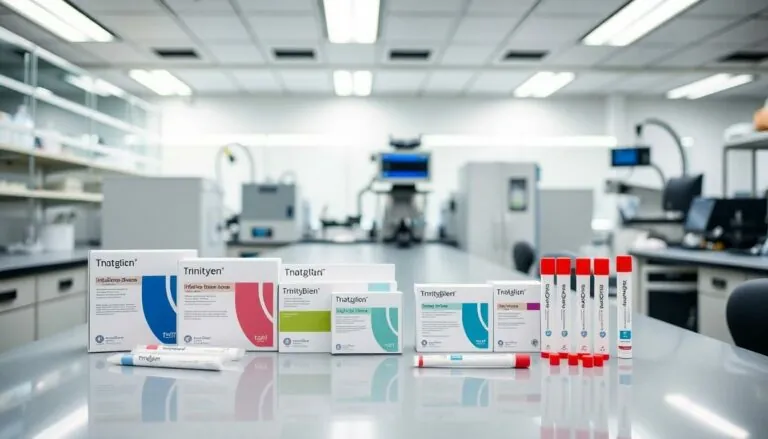Table of Contents
ToggleIn a world where science fiction is becoming reality, biotech manufacturing jobs are the unsung heroes behind the curtain. Picture this: you could be part of a team that transforms groundbreaking research into life-saving products. It’s like being a wizard, but instead of casting spells, you’re mixing proteins and cells to create magic in a lab coat.
As the biotech industry surges forward, it’s not just about curing diseases or developing cutting-edge therapies; it’s also about building a career that’s both rewarding and in high demand. With more companies popping up than ever, biotech manufacturing offers a treasure trove of opportunities for those ready to roll up their sleeves and dive into the future of healthcare. So, if you’re looking for a job that’s as exciting as a rollercoaster ride—minus the nausea—biotech might just be your perfect match.
Overview of Biotech Manufacturing Jobs
Biotech manufacturing jobs focus on producing biological products essential for healthcare. The roles include positions in quality control, production, and research and development. Skilled professionals in this field work with cutting-edge technology to manufacture vaccines, therapeutics, and diagnostic tools.
Positions in biotech manufacturing often require specialized training or degrees. Entry-level jobs might include laboratory technicians assisting in experiments. Mid-level positions may involve process engineers overseeing production efficiency and compliance. Senior roles often include project managers guiding teams through product development phases.
The demand for biotech manufacturing jobs continues to rise. In 2022, the global biotech sector was valued at approximately $1.64 trillion and is projected to grow at a compound annual growth rate of 15.6% through 2030. This rapid growth creates opportunity for job seekers looking to enter an innovative field.
Work environments vary significantly in biotech manufacturing. Some roles are laboratory-based, while others may occur in sterile production areas. Companies often emphasize safety and adherence to stringent regulations, making a keen eye for detail crucial.
Additionally, teamwork plays an integral role in achieving objectives. Collaborating with cross-functional teams enhances the innovation process. Biotech manufacturing careers offer not only job security but also the chance to make meaningful contributions to society, working on life-saving products aimed at preventing and treating diseases.
Types of Biotech Manufacturing Jobs

Biotech manufacturing offers a variety of roles crucial for innovation and production. These positions span across research, development, production, and quality control.
Research and Development Positions
Research and development roles focus on advancing technologies and creating new products. Scientists and researchers develop processes to improve existing therapies or discover novel treatments. Employing expertise in biology and chemistry, they work on experiments to validate hypotheses. Additionally, these positions often require advanced degrees in life sciences or engineering. Collaboration with regulatory teams ensures compliance during the development process. Pursuing a career in R&D represents a pathway to contribute to groundbreaking healthcare solutions.
Production and Quality Control Roles
Production and quality control roles ensure that biopharmaceutical products meet stringent safety and efficacy standards. Technicians and operators manage bioreactors, monitor processes, and conduct quality assessments. Skills in process optimization play a vital role in maximizing efficiency and output. Positions in quality control involve rigorous testing and documentation to adhere to regulatory guidelines. These jobs require attention to detail and may necessitate certifications in relevant fields. Working in production offers firsthand involvement in bringing life-saving products to market.
Skills Required for Biotech Manufacturing Jobs
Biotech manufacturing jobs demand a unique blend of technical and soft skills to navigate complex tasks and collaborate effectively in diverse environments.
Technical Skills
Technical skills hold significant importance in biotech manufacturing. Proficiency in laboratory techniques and equipment enhances efficiency and productivity. Familiarity with Good Manufacturing Practices (GMP) ensures compliance with regulatory standards. Knowledge of bioinformatics tools assists in data analysis and interpretation. Understanding of bioprocessing operations, including fermentation and purification, contributes to successful product development. Mastery of quality assurance methodologies guarantees that products meet safety and efficacy criteria.
Soft Skills
Soft skills play a crucial role in biotech manufacturing careers. Strong communication skills facilitate clear interaction across teams, essential for collaboration on projects. Problem-solving abilities help address challenges that arise during production processes. Adaptability allows professionals to navigate the rapidly evolving biotech landscape. Teamwork skills promote a cohesive work environment, fostering innovation and creativity. Attention to detail, vital in all stages of manufacturing, ensures precision and accuracy in outcomes.
Career Opportunities and Growth
Biotech manufacturing jobs offer numerous career opportunities across a spectrum of roles. Careers in this field include positions in research and development, quality control, and production. Each role requires unique training or educational backgrounds, making specialized skills highly valued. Entry-level positions often involve laboratory technicians who support various processes, while mid-level roles typically encompass process engineers contributing to system improvements.
Professionals aiming for senior positions frequently serve as project managers overseeing complex projects that drive innovation. The demand for these jobs reflects the global biotech sector’s valuation of approximately $1.64 trillion in 2022, which anticipates a compound annual growth rate of 15.6% through 2030. Job seekers should recognize the dynamic growth that makes this industry attractive.
Work environments in biotech manufacturing differ substantially. Some individuals operate in state-of-the-art laboratories, while others may be positioned in sterile production areas focused on safety and regulatory compliance. Team collaboration plays a pivotal role in achieving project goals. Engaging with cross-functional teams fosters innovation and enhances the overall production process.
The importance of research and development roles cannot be overstated. Such roles concentrate on advancing technologies and developing new products. Advanced degrees in life sciences or engineering are often a requisite. Close collaboration with regulatory teams ensures compliance with industry standards, reflecting the meticulous nature of the work.
Quality control and production roles are equally critical in ensuring that biopharmaceutical products adhere to safety and efficacy benchmarks. Technicians and operators, in these capacities, oversee bioreactor management, monitor processes, and conduct quality assessments requiring keen attention to detail. Certifications in relevant fields can enhance employability in this sector.
Skills required for success in biotech manufacturing blend technical and soft competencies. Technical proficiency in laboratory methods, familiarity with Good Manufacturing Practices (GMP), and a solid understanding of bioprocessing operations drive efficiency. Strong communication, adaptability, and problem-solving abilities promote a collaborative environment essential for innovation in this rapidly evolving sector.
Challenges in Biotech Manufacturing Jobs
Biotech manufacturing jobs face several challenges that can impact productivity and project outcomes. Regulatory compliance remains a significant hurdle, with strict guidelines from agencies like the FDA and EMA governing product safety and quality. Adhering to these regulations demands continuous training and updates for staff to ensure processes meet ever-evolving standards.
High costs associated with advanced technologies also pose a challenge. Many biotech companies invest heavily in state-of-the-art equipment and facilities. The need for substantial capital can inhibit innovation and slow down production timelines.
Additionally, a skilled workforce gap affects performance across the industry. Despite the increasing demand for biotech manufacturing professionals, the availability of candidates with the right qualifications and experience often falls short. This gap can lead to longer recruitment cycles and strain existing employees as they take on additional responsibilities.
Supply chain disruptions further complicate the landscape. Global events, supplier reliability, and material shortages can delay production schedules. Companies must develop contingency plans to remain resilient against these unforeseen disruptions.
Collaboration across departments also presents its own set of challenges. Effective communication between production, quality control, and regulatory teams is crucial for success. Misalignment in goals or processes can lead to inefficiencies and costly mistakes.
Lastly, maintaining a culture of safety is vital in manufacturing environments. Employees need to prioritize safety while working with complex bioprocessing operations. Continuous emphasis on safety protocols protects both personnel and product integrity.
Biotech manufacturing jobs offer an exciting pathway for those passionate about making a difference in healthcare. With the industry’s rapid growth and increasing demand for skilled professionals, opportunities abound across various roles.
From entry-level technicians to senior project managers, each position plays a crucial part in bringing innovative products to market. As the sector continues to evolve, individuals equipped with the right blend of technical and soft skills will find themselves well-positioned for success.
Embracing a career in biotech manufacturing not only promises personal fulfillment but also contributes to the advancement of life-saving technologies that benefit society as a whole.






